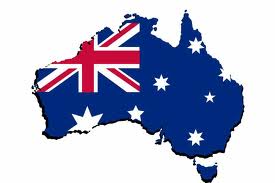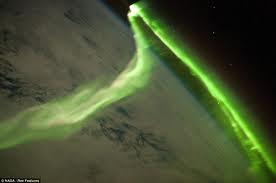
Australia
Is Australia Specifically Named In Bible Prophecy?
Copyright © 2012, Gun Lap

Aurora Australis

Australia |
Is Australia Specifically Named In Bible Prophecy?Copyright © 2012, Gun Lap
|

Aurora Australis |
In his book The United States and Britain in Prophecy Herbert Armstrong seems to assume that the term "Australi" used in the Vulgate translation of the Bible refers to Australia, and uses this as "proof" that people from the "lost tribes" of Israel were prophesied to migrate to Australia.
In this article I explain why this claim looks more like a hasty assumption than a divine revelation. First let's review what Armstrong wrote.
Referring to the house of ISRAEL, not Judah (Isaiah 49:3,6), God says: "Behold, these shall come from far: and, lo, these from the NORTH and from the WEST; and these from the land of Sinim" (Isa. 49:12). ... The Vulgate renders "Sinim" as "Australi," or "Australia." So we now have the location [of Israel] northwest of Jerusalem and even spreading around the world. (The United States and Britain in Prophecy, 1980, chapter 9, section "Lost Israel Located," p. 117, original emphasis, Herbert W. Armstrong).
So Armstrong associates "Australi" with "Australia" based on the Vulgate. But what is the Vulgate? Wikipedia says:
The Vulgate is a late 4th-century Latin translation of the Bible. It was largely the work of St. Jerome, who was commissioned by Pope Damasus I ... and ultimately it became the definitive and officially promulgated Latin version of the Bible in the Roman Catholic Church. (Wikipedia, article Vulgate, as of Jan 1, 2012).
So the Vulgate is simply a translation of the Bible into Latin. Now, what does "Australi" mean in Latin? I went to Google Translate (free on the Web), changed the input language to Latin and the output language to English. I put in "Australi" and out came "south," so Australi just means south.
We don't really need to translate the word if we call to mind a little scientific terminology many people are already familiar with.
Most readers have heard of the Aurora Borealis, or Northern Lights, and know they are a natural phenomenon of lights in the sky that appear near the North magnetic pole. Aurora Borealis is simply the scientific (Greek-Latin) term for Northern Lights. Aurora just means light and Borealis means Northern. The same natural phenomenon takes place in the Southern Hemisphere, and is called the Southern Lights, or Aurora Australis. Australis is just the Latin for Southern.
So "Australi" in the Vulgate has nothing to do with Australia. It is simply the Latin word for South. The only connection between Australia and the Vulgate translation is that Australia is in the South and was named from the Latin word for Southern.
The Wikipedia article Australia (on Jan 1, 2012) says "the name Australia is derived from the Latin australis, meaning 'southern'."
The connection Armstrong makes between the Vulgate "Australi" and the English-speaking nation of "Australia" seems to have no scriptural support.
In the quote above Armstrong said that the words "north" and "west" combine to give us the location of some Israelites northwest of Jerusalem. A few paragraphs later he says:
Take a map of Europe. Lay a line due NORTHWEST of Jerusalem across the continent of Europe, until you come to the sea, and then to the islands in the sea! This line takes you directly to the British Isles! (The United States and Britain in Prophecy, 1980, Herbert W. Armstrong).
Notice he says due northwest of Jerusalem. If Jerusalem is the reference point, and if we accept the translation "Australi" for Sinim, then Australi, which means south, must refer to a location due south of Jerusalem. But Australia is not directly south of Jerusalem, it's not even close. Go due south from Jerusalem a long way and one is still west of Madagascar. To get to Australia the vast expanse of the Indian Ocean must still be traversed.
I have already proved my point, but at the risk of overkill, let's look at this scripture in a few other translations to see if we can clearly determine the meaning of the word "Sinim" used in the King James ("Australi" in the Latin).
(1) "Lo, these shall come from far; and, lo, these from the north and from the west; and these from the land of Sinim." (American Standard Version).
(2) "See, they will come from afar—some from the north, some from the west, some from the region of Aswan." (New International Version).
(3) "Lo, these shall come from afar, and lo, these from the north and from the west, and these from the land of Syene." (Revised Standard Version).
(4) "Then my people will return from distant lands in the north and the west and from the city of Syene." (Contemporary English Version).
(5) "Look: These coming from far countries, and those, out of the north, These streaming in from the west, and those from all the way down the Nile!" (The Message).
(6) "Look, people are coming to me from far away, from the north and from the west, from Aswan in southern Egypt." (New Century Version).
(7) "Behold, these shall come from far: and these from the north and the west, and others from the land of the Persians." (The Septuagint (Greek OT) translated into English by Sir Lancelot C. L. Brenton).
(8) "Behold, these shall come from afar—and, behold, these from the north and from the west, and these from the land of Sinim (China)." (Amplified Bible).
(9) "Behold these shall come from afar, and behold these from the north and from the sea, and these from the south country." (Douay-Rheims Bible)
Note that nobody really seems to know what this verse is referring to, and thus the different translations, China, Egypt, the Nile, Syene, Persia, etc. Armstrong seems to have no basis for claiming it is Australia.
Note that the Douay-Rheims Bible simply renders it "the south country" which is basically the same as the Vulgate does, since Australi in Latin just means south.
I added a footnote citing Barnes' commentary for those who wish to investigate the meaning of Sinim further. But the most interesting thing from the commentary is the statement that "Sinim ([Hebrew:] siyniym) occurs nowhere else in the Bible." In other words, the Bible does not interpret itself; some pieces of the jigsaw puzzle are missing!
But I digress.
In 20-20 hindsight it looks like Armstrong made a dumb mistake—a giant leap. The Worldwide Church of God (WCG) ordained hundreds of ministers. Somebody should have been assigned to do some fact-checking. Somebody should have noticed this a lot sooner and got the book corrected. The same mistake appears on p. 114 of the earlier, 1967, version of the book The United States and British Commonwealth in Prophecy. Thirteen years passed between the 1967 and 1980 versions of the book, yet the error was not corrected; nobody was fact-checking. Either that, or corrections sent in by readers were being suppressed. The same error persists 42 years later, in the Philadelphia Church of God's 2009 version of the book (see the footnote for more information).
A lot more could be said about mistakes that Armstrong made in prophecy. A lot of the things he wrote are easy to disprove if we know how, but when I read Armstrong's book as a young man about 20 I was quite impressed with the overall picture. I did the best I could to carefully analyze what I was reading. I went to the library and read history books, checked different Bible translations, etc. I missed a lot of things that I can see now. We didn't have the Web in those days so information was a lot harder to find. That was a huge disadvantage.
There are a few lessons in here about how one can be deceived even after doing a lot of research and checking a lot of things out. And the lessons are not just for Armstrong's followers, because everyone on the planet holds beliefs that sound logical but which they have not taken the time to check in every detail. There are always those things we miss. Perhaps we have carelessly assumed that others will find and fix them for us.
Note: The picture of the Southern Lights was taken on my last trip aboard the International Space Station. Well, not quite. But it was taken by astronauts aboard the International Space Station.
Note: Wikipedia can be a terrible source on certain issues, such as those that are political or controversial in nature. It is monitored and edited by individuals and groups with a political agenda. However, it can be useful on purely technical matters of a non-controversial nature. I use Wikipedia for certain things because it's a readily accessible reference source for readers.
Note: Here is what Barnes' commentary says about the translation of "the land of Sinim" used in the King James.
There have been many different opinions in regard to the 'land of Sinim.' The name 'Sinim' ([Hebrew:] siyniym) occurs nowhere else in the Bible, and of course it is not easy to determine what country is meant. It is evident that it is some remote country, and it is remarkable that it is the only land specified here by name. Some, it is said, should come from far, some from the north, others from the west, and another portion from the country here specifically mentioned. Jerome [the chief translator of the Vulgate] understands it of the south in general - Isti de terra Australi. The Septuagint understands it as denoting Persia ... The Chaldee also interprets it as Jerome has done, of the south. The Syriac has not translated it, but retained the name Sinim. The Arabic coincides with the Septuagint, and renders it, 'From the land of Persia.' Grotius supposes that it means the region of Sinim to the south of Palestine, and Vitringa also coincides with this opinion.
Bochart supposes that it means the same as Sin or Syene, that is, Pelusium, a city of Egypt; and that it is used to denote Egypt, as Pelusium was a principal city in Egypt. In Ezekiel 30:15, Sin or Pelusium (margin) is mentioned as 'the strength of Egypt.' Gesenius supposes that it refers to the Chinese, and that the country here referred to is Sina or China. (Barnes' Notes on the Bible, found here).
Note: The Philadelphia Church of God has edited their version of Armstrong's book at least three times (in 2003, 2007, 2009), and the copy I have shows they still have not fixed this error as of that version. The error occurs on p. 98 in the PDF file of the 2009 version, 42 years after the 1967 version. Is anybody doing any fact-checking over there? By the way, anyone who wants to know what Armstrong himself taught has to get the original versions of his works, not the deceitfully altered PCG versions. The PCG bears false witness to Armstrong's words. They act like owning the legal copyright to his works gives them the moral right to change his words without telling their readers what was changed. This is a repugnant fraud. It might be legal, but it's bearing false witness, and considering the consequences, e.g. how they use this to trick people into thinking Flurry is a prophet, it's pure evil. (We have an article on this here). Gerald Flurry considers Armstrong an apostle but he seems to have lost the fear of God. Flurry should reread 2 Peter 3:15-16, regarding those who wrest the words of an apostle to their own destruction.